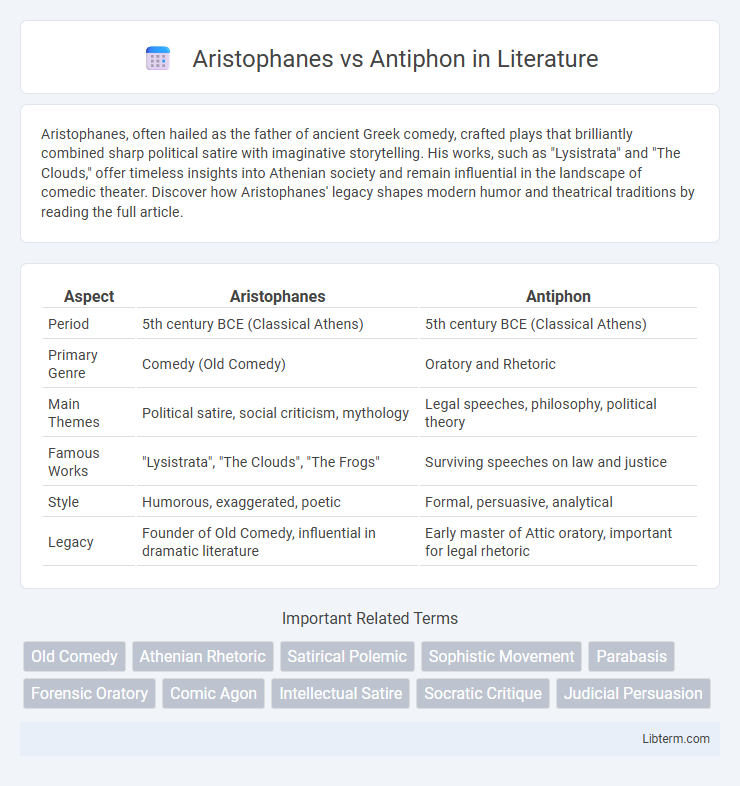Aristophanes, often hailed as the father of ancient Greek comedy, crafted plays that brilliantly combined sharp political satire with imaginative storytelling. His works, such as "Lysistrata" and "The Clouds," offer timeless insights into Athenian society and remain influential in the landscape of comedic theater. Discover how Aristophanes' legacy shapes modern humor and theatrical traditions by reading the full article.
Table of Comparison
| Aspect | Aristophanes | Antiphon |
|---|---|---|
| Period | 5th century BCE (Classical Athens) | 5th century BCE (Classical Athens) |
| Primary Genre | Comedy (Old Comedy) | Oratory and Rhetoric |
| Main Themes | Political satire, social criticism, mythology | Legal speeches, philosophy, political theory |
| Famous Works | "Lysistrata", "The Clouds", "The Frogs" | Surviving speeches on law and justice |
| Style | Humorous, exaggerated, poetic | Formal, persuasive, analytical |
| Legacy | Founder of Old Comedy, influential in dramatic literature | Early master of Attic oratory, important for legal rhetoric |
Introduction to Aristophanes and Antiphon
Aristophanes, a prominent ancient Greek playwright, is renowned for his satirical comedies that critically depict Athenian society and politics. Antiphon, a notable sophist and logographer, specialized in rhetorical speeches and legal oratory, influencing early Greek rhetoric and judicial practices. Their contrasting contributions highlight Aristophanes' impact on comedic literature and social satire, while Antiphon's work laid foundational principles in rhetorical persuasion and courtroom argumentation.
Historical Context: Classical Athens
Aristophanes, a prominent playwright of Classical Athens, used his comedies to critique the political and social issues during the Peloponnesian War, reflecting Athenian democracy and public opinion. Antiphon, known as an early sophist and orator, played a key role in the development of Athenian legal rhetoric amid the political upheaval following the war and the fall of the democracy. Their works collectively illuminate the shifting cultural dynamics and intellectual environment of 5th-century BCE Athens.
Aristophanes: Life and Literary Contributions
Aristophanes, a prominent Athenian playwright of the 5th century BCE, is renowned for pioneering Old Comedy with works such as "Lysistrata" and "The Clouds," which combined sharp political satire, social commentary, and imaginative humor. Unlike Antiphon, a Sophist and orator known for rhetorical skill and political involvement, Aristophanes' legacy lies in his innovative theatrical techniques and vivid portrayal of contemporary Athenian society. His plays remain invaluable sources for understanding classical Greek culture, politics, and the evolution of comedic literature.
Antiphon: Biography and Rhetorical Works
Antiphon, a prominent 5th-century BCE Athenian orator and logographer, is recognized for pioneering the development of forensic rhetoric and legal speeches in ancient Greece. His extant works reveal a mastery of persuasive argumentation designed to influence jury decisions in court, emphasizing clarity, logical structure, and emotional appeal. Unlike Aristophanes, whose comedic plays targeted social and political issues through satire, Antiphon's contributions lie in his systematic approach to rhetoric, significantly shaping the tradition of classical oratory.
Philosophical Perspectives: Comedy vs Oratory
Aristophanes' comedic works critique contemporary Athenian society by employing satire to challenge political and philosophical ideas, emphasizing the power of humor in public discourse. Antiphon's oratory, rooted in legal and rhetorical precision, advances persuasive argumentation aimed at influencing judicial and political outcomes through structured reasoning. The contrast between Aristophanes' imaginative, subversive comedy and Antiphon's formal, pragmatic rhetoric reflects divergent approaches to truth and persuasion in classical Athens.
Political Influence and Public Impact
Aristophanes wielded significant political influence through his sharp comedic plays that critiqued Athenian democracy and prominent politicians, shaping public opinion in 5th-century BCE Athens. His satirical works, such as "The Clouds" and "Lysistrata," engaged wide audiences by exposing political corruption and social issues, thereby affecting public discourse and citizen attitudes. In contrast, Antiphon, as a logographer and orator, influenced politics more directly through persuasive speechwriting and legal expertise in Athenian courts, impacting political decisions and justice administration within the democratic framework.
Literary Style and Techniques
Aristophanes is renowned for his vivid use of comedic satire, employing sharp dialogue, exaggerated characters, and imaginative metaphors to critique contemporary Athenian society and politics. In contrast, Antiphon's literary style is marked by concise, rhetorical speeches with structured arguments designed to persuade juries in legal contexts, emphasizing clarity and logical appeal over artistic flourish. While Aristophanes leverages humor and irony to engage audiences emotionally, Antiphon prioritizes reasoned discourse and rhetorical precision, reflecting their distinct roles as playwright and orator.
Major Works Comparison
Aristophanes' major works, including "Lysistrata" and "The Clouds," are renowned for their sharp political satire and comedic portrayal of Athenian society, contrasting with Antiphon's contributions primarily in oratory and rhetoric, especially his speeches such as "On the Murder of Herodes." While Aristophanes utilized comedic drama to critique social and political issues, Antiphon's influence lies in his role as one of the earliest logographers who shaped early forensic oratory and legal argumentation in 5th-century BCE Athens. This comparison highlights Aristophanes' impact on theatrical literature versus Antiphon's foundational work in legal rhetoric and speechwriting.
Legacy in Classical Literature
Aristophanes is celebrated for pioneering Old Comedy with sharp political satire, influencing subsequent comedic playwrights and preserving Athenian social critiques through vivid dramatization. Antiphon, primarily known as an orator and logographer, contributed to classical rhetoric by shaping forensic speechwriting and laying groundwork for judicial oratory in Athens. Their legacies intersect in the realm of classical literature by enriching the cultural and intellectual fabric of ancient Greece--Aristophanes through theatrical innovation and Antiphon through rhetorical precision.
Conclusion: Contrasts and Lasting Influence
Aristophanes and Antiphon diverge sharply in style and purpose, with Aristophanes mastering comedic satire and social critique, while Antiphon champions rhetorical precision and legal argumentation. Their contrasting contributions shaped ancient Greek literature, where Aristophanes influenced comedic traditions and public discourse, and Antiphon laid foundational principles for forensic oratory. The enduring legacy of both highlights a dynamic interplay between humor and rhetoric in classical antiquity's intellectual landscape.
Aristophanes Infographic

 libterm.com
libterm.com